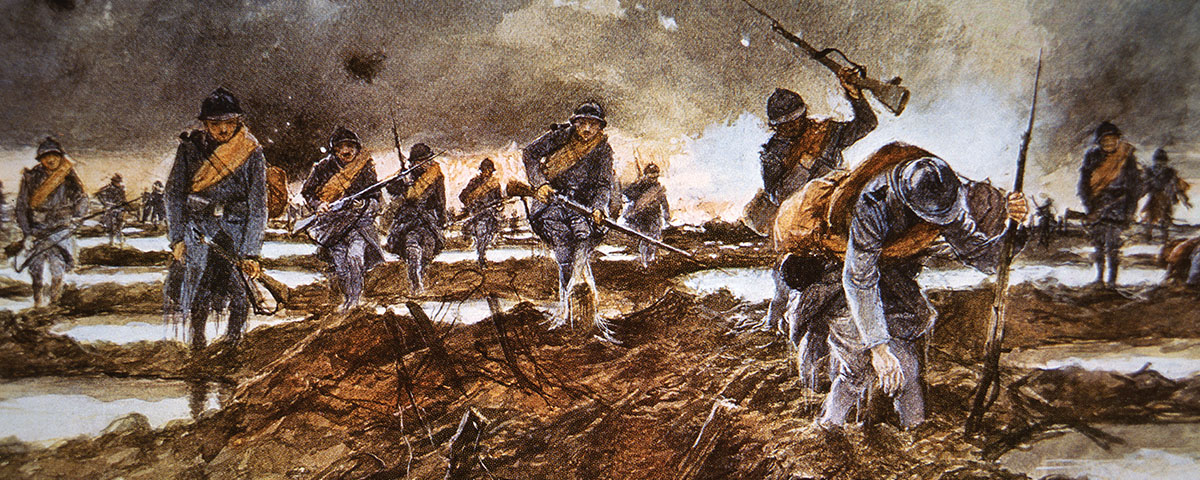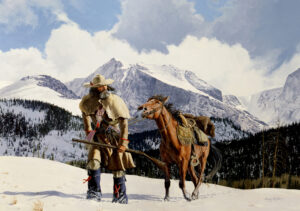Mary Borden was born in 1886 with the proverbial silver spoon in her mouth: Her father, a prominent Chicago lawyer, had struck it rich as one of the lead investors in a fabulously successful silver-mining venture in Colorado. After graduating from Vassar College in 1907, Borden embarked on a chaperoned trip around the world and met George Douglas Turner, a Scottish lay missionary. The two were married in 1908 and later settled in London, where Borden joined the suffragette movement and was arrested during a demonstration in Parliament Square. While living in London, Borden met Percy Wyndham Lewis, the English writer, painter, and critic, and became his lover and patron. Using the pseudonym Bridget MacLagan, she wrote an autobiographical novel (The Mistress of Kingdoms) and a play based on it.
In July 1915, following the outbreak of World War I, Borden tapped her sizable inheritance to equip and staff a frontline field hospital at Rousbrugge, Belgium. She would go on to run military hospitals at Bray-sur-Somme and Mont-Notre-Dame (the French government would recognize Borden’s wartime service by awarding her the Croix de Guerre). While in France she had an affair with Captain Edward Louis Spears, a British liaison officer who served with the French army on the Somme. In 1918, following the dissolution of her marriage to Turner, Borden married Spears, and the two settled in Paris.
After the war, drawing on her experiences as a nurse on the front lines, Borden published The Forbidden Zone, a collection of poems and short stories. She became a prolific, best-selling author and high-profile advocate for women’s rights and other—often controversial—causes.
With the onset of World War II Borden once again ran mobile hospitals on the French front, and in 1940 she barely managed to escape from France as it fell to Nazi Germany. She went on to serve with Free French forces in the Middle East and, toward the end of the war, in eastern France. After the war she resumed writing, publishing her last novel at age 70. She often returned to United States and in the 1950s helped Democratic senator Adlai Stevenson II of Illinois, her nephew-in-law, in his two presidential campaigns, writing some of his speeches. She died in England in 1968 at age 82.
The following poem was one of three published in the English Review in 1916 under the general title “At the Somme” and reprinted in the American magazine Current Opinion the following year.
The Song of the Mud
This is the song of the mud,
The pale yellow glistening mud that covers the hills like satin;
The grey gleaming silvery mud that is spread like enamel
over the valleys;
The frothing, squirting, spurting, liquid mud that gurgles
along the road beds;
The thick elastic mud that is kneaded and pounded and
squeezed under the hoofs of the horses;
The invincible, inexhaustible mud of the war zone.
This is the song of the mud, the uniform of the poilu.
His coat is of mud, his great dragging flapping coat,
that is too big for him and too heavy;
His coat that once was blue and now is grey and stiff
with the mud that cakes to it.
This is the mud that clothes him. His trousers and boots
are of mud,
And his skin is of mud;
And there is mud in his beard.
His head is crowned with a helmet of mud.
He wears it well.
He wears it as a king wears the ermine that bores him.
He has set a new style in clothing;
He has introduced the chic of mud.
This is the song of the mud that wriggles its way into battle.
The impertinent, the intrusive, the ubiquitous, the unwelcome,
The slimy inveterate nuisance,
That fills the trenches,
That mixes in with the food of the soldiers,
That spoils the working of motors and crawls into
their secret parts,
That spreads itself over the guns,
That sucks the guns down and holds them fast in its
slimy voluminous lips,
That has no respect for destruction and muzzles
the bursting shells;
And slowly, softly, easily,
Soaks up the fire, the noise; soaks up the energy
and the courage;
Soaks up the power of armies;
Soaks up the battle.
Just soaks it up and thus stops it.
This is the hymn of mud—the obscene, the filthy, the putrid,
The vast liquid grave of our armies. It has drowned our men.
Its monstrous distended belly reeks with the undigested dead.
Our men have gone into it, sinking slowly, and struggling
and slowly disappearing.
Our fine men, our brave, strong, young men;
Our glowing red, shouting, brawny men.
Slowly, inch by inch, they have gone down into it,
Into its darkness, its thickness, its silence.
Slowly, irresistibly, it drew them down, sucked them down,
And they were drowned in thick, bitter, heaving mud.
Now it hides them, Oh, so many of them!
Under its smooth glistening surface it is hiding them blandly.
There is not a trace of them.
There is no mark where they went down.
The mute enormous mouth of the mud has closed over them.
This is the song of the mud,
The beautiful glistening golden mud that covers
the hills like satin;
The mysterious gleaming silvery mud that is spread like
enamel over the valleys.
Mud, the disguise of the war zone;
Mud, the mantle of battles;
Mud, the smooth fluid grave of our soldiers:
This is the song of the mud.
[hr]
This article appears in the Spring 2019 issue (Vol. 31, No. 3) of MHQ—The Quarterly Journal of Military History with the headline: Somme Song

Want to have the lavishly illustrated, premium-quality print edition of MHQ delivered directly to you four times a year? Subscribe now at special savings!





